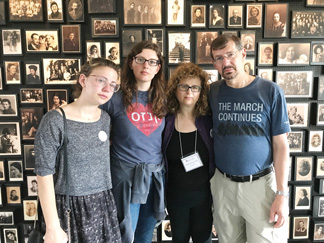
I traveled with 50 Jewish and Muslim women from across the U.S. this summer on the Sisterhood of Salaam Shalom (SOSS) Building Bridges trip to Berlin and Poland. The purpose of the trip was to witness what happens when hate is unchecked and to understand what we can do today to ensure it doesn’t happen again, to anyone.
One of our stops in Berlin was at Gleis (Track) 17. Fifty thousand Berlin Jews boarded the train from this track, ultimately taken to their deaths. They were told to pack their most valuable possessions in their suitcases and purchase their own tickets.
Praying together, with all our hearts, brought tears to everyone’s eyes, and that helped bring the tears I needed to shed. I cried for what the worst of humanity brought; I cried for the best of humanity — the innocent Jews and the women standing together to honor their memory.
With the rise of anti-Semitism and Islamophobia in Europe, we learned about initiatives on the ground that help foster Muslim and Jewish relationships for better understanding and friendship. After visiting mosques and synagogues in Berlin, we traveled by train to Warsaw and then by bus to Krakow to face the inevitable: Auschwitz.
En route, Dr. Mehnaz Afridi, our expert guide in Holocaust studies, suggested we be silent for 30 minutes. I sat toward the back with a view of my sisters sitting in silence, several with headscarves and kippot as we drove by the fields of green and yellow. We were on this sacred journey together.
There was a regimented way to enter Auschwitz. One ticket at a time, one person at a time; we were to stay in line and do exactly as told. I started to boil, but of course, this was nothing compared to what the victims went through. I felt numb as our tour guide spoke.
Then I saw the case full of hair and broke down.
Once in Auschwitz II, also known as Birkenau, the scope of the death machine was even more incomprehensible. We made our way to a building called Kanada, where the Nazis stored items taken from the Jews in order to use them in the war effort.
We came to a room that displayed photos brought to the camp in the victims’ suitcases. We stood in a circle and prepared for the second memorial service of our trip.
This was the first known Muslim and Jewish women’s group from the U.S. to experience Berlin, Warsaw, Krakow and Auschwitz-Birkenau together. It didn’t matter if one was Jewish or Muslim. We all shed tears for the lives lost, and what could have been.
Women named loved ones who perished in the Holocaust. A couple of our Muslim sisters read names given to them by Jewish sisters who could not join the trip. The names of 66 Muslims who were also murdered at Auschwitz were read aloud.
As a few of us were walking out of Birkenau, we saw a group of German high school teens. They told us they signed up for enrichment to learn about the Holocaust. It was not obligatory. They were also inspired by the work of SOSS and our traveling together in Berlin and Poland. Walking out of Birkenau with the German teens gave us hope.
The next day we helped clean up at the Jewish cemetery in Krakow as a way to heal. Together, we cleared an area of weeds, swept and some wiped off dirt from gravestones to honor the deceased.
Since our return to the U.S., the Muslim and Jewish women are even more committed to helping immigrants, getting people registered to vote, making care packages with socks and toiletries for asylum seekers; teaching people of all ages about the Holocaust; attending rallies that speak truth to power, expressing that it’s not OK to use hate speech, which incites white supremacists to have carte blanche in carrying out terrorist attacks in our own country.
As Jews, we say, “Never again.” To me that means Never Again to Jews or to anyone.
In the midst of evil, I find strength in the best of humanity – with my sisters in the Sisterhood of Salaam Shalom.
Sheila Sonnenschein is a founding member of Sisterhood of Salaam Shalom in Greater Kansas City and actively promotes interfaith understanding.


